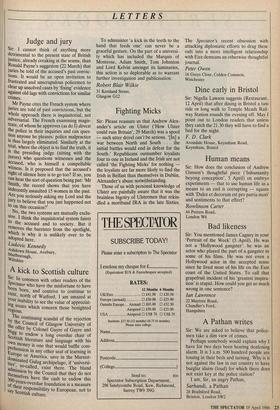LETTERS Judge and jury
Sir: I cannot think of anything more detrimental to the present state of British justice, already creaking at the seams, than Ronald Payne's suggeston (22 March) that Juries be told of the accused's past convic- tions. It would be an open invitation to frustrated and unscrupulous policemen to clear up unsolved cases by 'fixing' evidence against old lags with convictions for similar crimes.
Mr Payne cites the French system where Juries are told of past convictions, but the whole approach there is inquisitorial, not adversarial. The French examining magis- trate, of whom he approves (as do I) directs the police in their inquiries and can ques- tion anyone he pleases: police malpractice is thus largely eliminated. Similarly at the trial, where the object is to find the truth, it is the presiding judge (sitting with the Jurors) who questions witnesses and the accused, who is himself a compellable witness. Is it proposed that the accused's right of silence here is to go too? If so, you can hear the sort of question being put: 'Mr Smith, the record shows that you have indecently assaulted 15 women in the past. Are you seriously asking my Lord and the jury to believe that you just happened not to on this occasion?'
No, the two systems are mutually exclu- sive. I think the inquisitorial system fairer to the accused and to society. But it removes the barrister from the spotlight, which is why it is unlikely ever to be adopted here. Ludovic Kennedy
Ashdown House, Avebury, Marlborough Wiltshire


















































 Previous page
Previous page